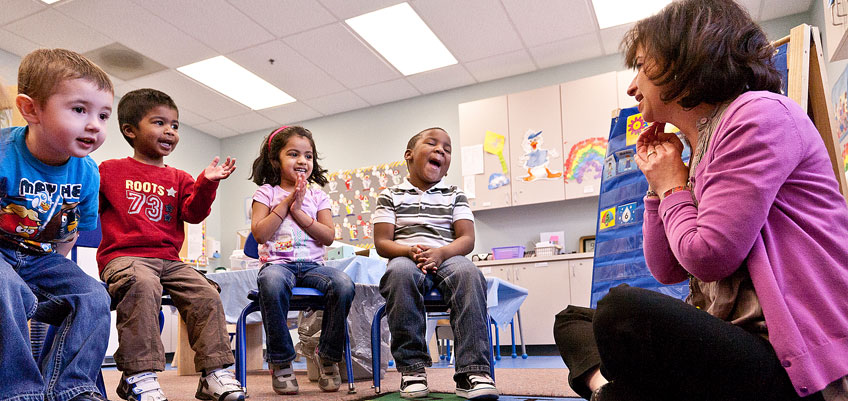
Since 1972, the Beaumont Children’s Speech and Language Pathology department has helped thousands of children with speech and language impairments find their voices. Our highly trained Beaumont Children's speech and language pathologists use advanced techniques to help children achieve maximum communication capability, functional capacity and social potential.
These dedicated therapists are clinically certified and state-licensed specialists in childhood speech and language disorders. Beaumont's Speech and Language Pathology department is also a highly recognized training center for physicians and graduate-level students in the field.
Benefits of speech and language treatment
We offer specialized speech and language therapy treatment for children from birth to adolescence. The program includes:
- Individual treatment sessions focusing on speech and language skills specific to each child.
- Group treatment sessions focusing on carry-over of speech and language skills as well as socialization skills.
- Direct caregiver education, including observation of treatment sessions so techniques can be implemented at home and in other environments.
Parent and caregiver involvement and treatment overview
Families are an important part of the Beaumont Children's speech and language therapy program from the very start. The first step for a new patient is a diagnostic evaluation completed by a specialized speech and language pathologist. The pathologist then shares the evaluation and test results with the parents and an individualized treatment program is developed for each child based upon parental input and the severity of the communication disorder.
We offer individual speech and language disorder treatment sessions one or two times per week working toward long-term treatment goals. Parent observation and education continues throughout the treatment program. Home programs are designed to enhance the child's progress outside the clinic environment. Specialized group programs help each child practice new skills in a group setting, building confidence and advancing the child toward his or her goals.
AREAS WE TREAT
A neurological and developmental disorder characterized by impairments in social communication.
A neurological and developmental disorder characterized by impairments in social communication.
A communication disorder that results in developmental delays and difficulties in the ability to understand and/or use language at an age-appropriate level.
Occurs when the roof of the mouth does not completely close, leaving an opening that can extend into the nasal cavity.
A small electronic device implanted in the ear that can help a child with little to no hearing.
A motor speech disorder that causes children to have difficulty coordinating oral motor movements necessary to produce and combine speech sounds to form syllables and words accurately.
A disorder caused by the presence of an extra chromosome 21 and characterized by intellectual disabilities and distinguishing physical features.
Impairments related to the written format of language, including both reading and writing.
Resulting in speech, language and swallowing/feeding impairments.
The study of the muscles and skeletal structures of the mouth and face that affect speech, swallowing and/or chewing. Disoders include tongue thrust and dental-occlusal defects.
A regular pattern of certain word speech mistakes. These can be common in young children but may be a disorder if they persist past a certain age.
These disorders effect the way the child uses communication both verbally and non-verbally. Pragmatic skills include conversational skills, body posture, facial expression and eye contact.
A speech disorder in which the child repeats words or phrases, has poor pronunciation of words, leaves out words or sounds, and speaks some words that are hard to recognize. Normal developmental stuttering is normal under five years old.
It may be a disorder if it continues as the child gets older.
A brain injury caused by trauma.
RE/MAX Communication Preschool Program
In addition to our therapy services, Corewell Health William Beaumont University Hospital Care Center - 4949 Coolidge Hwy hosts a specially funded preschool that incorporates
techniques to improve communication while learning. Learn more about the RE/MAX program.
Treatment scholarship opportunities
To participate in pediatric speech & language services, there are some treatment scholarships available for children in need. Sources of funding include the Lions Clubs of Southeast Michigan and First Word Society. Families are approved based upon financial need as outlined by the donors and the Beaumont Health Foundation. Partial coverage of treatment costs may be provided in three-month increments.
As you may be enrolled in other therapies like physical and occupational therapy, we will work with you to coordinate scheduling accordingly. To begin the scheduling process for your new patient appointment, call 248-655-3191.
If you are a current patient and either need to reschedule your visit or ask for additional information, please call the location you are attending.